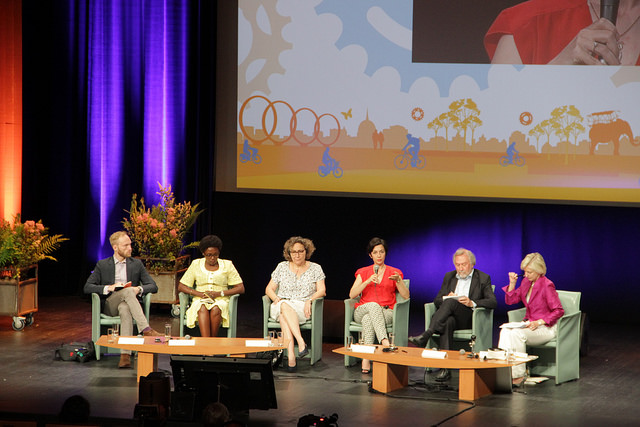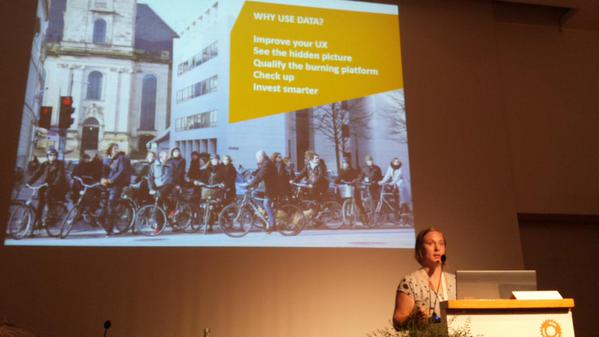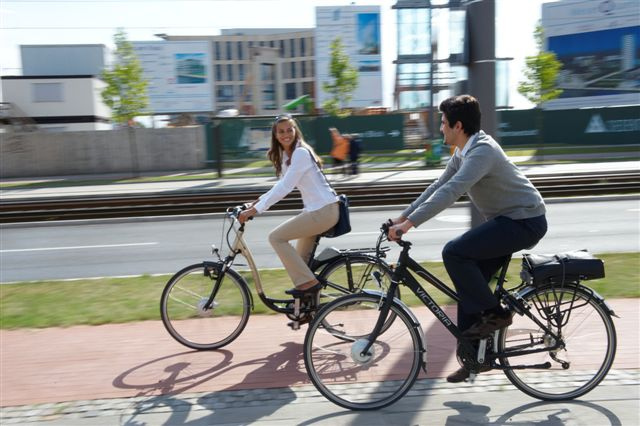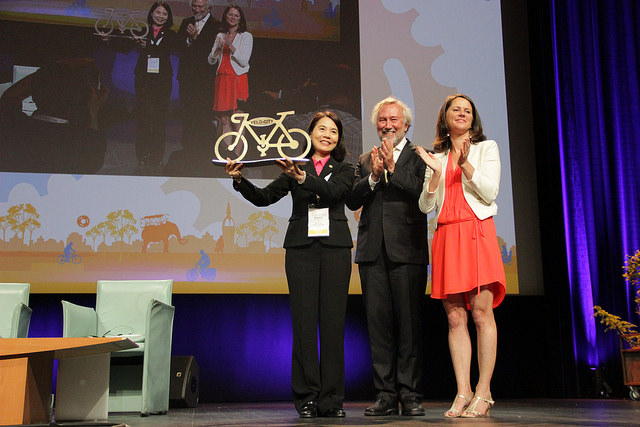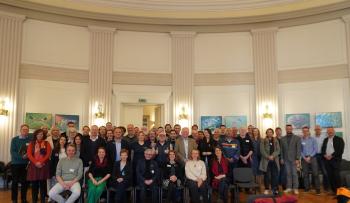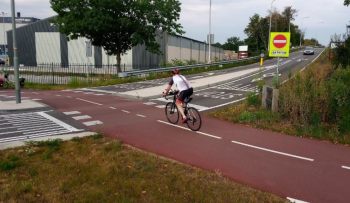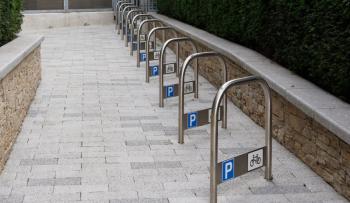
Velo-city Day 4 round-up - Friday, 5 June
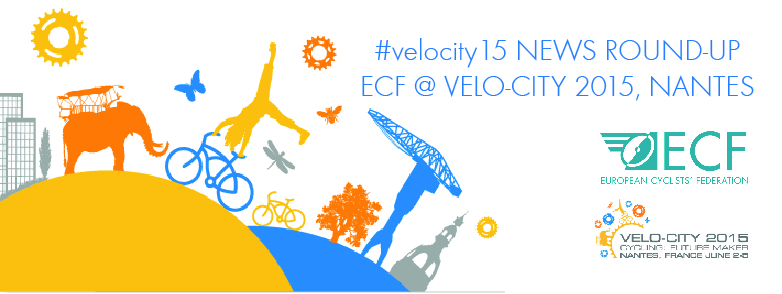
The 4th and final day of Velo-city 2015 proved to be a special one with some major cycling topics discussed. Here come the last highlights!
As the saying goes: All good things must come to and end! Friday 5th of June was the last day of Velo-city 2015. We have had an amazing time here in Nantes. New ties have been forged and old friendships reinforced and the cycling world stands more united than ever. This is a good way forward! Next stop is Velo-city Global 2016 in Taipei City, Taiwan. See you there!
Here we bring you the last Nantes round-up with the highlights of the 4th and final day of Velo-city 2015. This is a news digest – click on the links if you’re looking to follow the action more closely or follow us on our special Live Page and, naturally, on social media.
Here is a selection of what happened on the fourth and last day at #velocity15:
- Role of the Bicycle in Sustainable Development: Pedaling towards Social Change
- Mobilising Cycling Knowledge and Understanding Cycling Habits
- E-cycling and Infrastructure for Fast Cyclists and Light E-vehicles
- Thank you Nantes! Next Stop Velo-city Global 2016 Taipei!
Role of the Bicycle in Sustainable Development: Pedaling towards Social Change
We will need to meet challenges of the 21st century in such a way as to not compromise the prosperity and development opportunities of future generations. What then can the bicycle – a key technological development of the 19th century – contribute to these efforts? A session called "The Bicycles as a Strong Link in the Social Chain of Sustanable Development" examined the ways in which investing in and promoting cycling can contribute to social equity and economic prosperity in both wealthy and emerging countries. Speakers highlighted why, in an age of rampant motorisation and (soon) automated driving, many communities choose active transport to fundamentally anchor sustainable development in communities across the world.
According to Amanda Ngabirano, Urban and regional planner lecturing at Makerere University in Uganda, cyclists in many African countries experiencing rapid urbanisation are poor and invisible eventhough cycling holds a huge potential for the region. She therefore calls for a change off the mindset in Africa: cycling should more included in all aspect of transport planning and roadsafety. She encouraged the audience to"Use the bicycle because it feels good and not because you are forced to !".
Arzu Tekir, Executive Director of EMBARQ (Turkey), agreed that there needs to be change of mentality towards cycling in many countries and the civil society has arole to play in this change. "The way to change the general mindet is to engage the civil society", she said. "The change will come from civil society. We are the majority!", ECF President Manfred Neun concluded.
Mobilizing Cycling Knowledge and the Use of Data to Undertand Cycling Habits
Capitalizing and improving on the collective knowledge about cycling is surely a path to follow. Cycling Embassy or center, whatever their name and scale, these initiatives all have the same goal: centralize and share cycling know-how. A session titled "Mobilizing Cycling Knowledge" explored possibilities and challenges in connection to these topics.
The rise of new technologies make collecting knowledge on cycling easier than ever. These technologies enable us to better understand the habits of cyclists and to associate them to cyclability audits, to compare the different methods and their added-value. What are the recommendations for evaluation, especially on methodological choices? Speakers in Friday's session "Counting and Evaluation: Who Cycles Anyway?" tried to provide answer for this question.
In the session "Everybody Wants Figures" held earlier on Wednesday 3. June, start-ups and initiatives from all over the globe presented tools and apps that help to gather data on the behaviour of cyclists and the condition of cycling routes. There were contributions from amongst others Brasil, Finland, Belgium, Austria and Japan. Even though far away from each other, they all shared the goal of making better data on cycling available at the local level through methods like user surveys or GPS tracking. For example, the initiative "Champs libres" from Wallonia presented its "cyclability" open-source mapping project, which gives detailed data on the cycling conditions on certain streets. Cyclists can also signal problems they encounter on their routes.
Another great example on how technology can help us collect important cycling data is the Eco-Counter that is in use in Nantes. This automated counting systems that collects real-time data on the number of cyclists is installed all along the city's cycling routs. During a technical tour organised on the last day of Velo-city participants had the chance to visit the collection points and learn about data collection with counting systems. Drawing on a database of 1196 counters across 29 countries Eco-counter tries to measure the proggress of bicycle use globally.
E-cycling and Infrastructure for Fast Cyclists and Light E-vehicles
Pedelecs are charming more and more citizens. This means that some cyclists can go very fast – so what does this mean for infrastructure? how can we take advantage of this potential? How should we adapt cycling policy ? Why do the Dutch discuss nowadays on speed limits for cyclists on bicycle paths? Two sessions explored these topics on fast cyclists, e-bikes and infrastructure on the last day at Velo-city 2015.
Thank you Nantes! Next Stop Velo-city Global 2016 Taipei!
In the Closing Plenary of Velo-city 2015 many high-level speakers took the stage to reaffirm the status of cycling as true future-maker. Cycling is more relevant than ever for our societies and our environment.
Gisela Splett, Secretary of State of Baden-Württemberg (Germany), reminded the audience that the first ever bicycle was invented as a transport solution after a volcanic eruption made using horses impossible. She said that we now deal with another kind of cloud of pollution that makes current motorised means of transportation unfeasible.
Andre Dzikus, Coordinator of UBSB at UN-Habitat, called for a global modal shift from motorised transport to active mobility in his speach at the Closing plenary. According to him cycling is closely related with sustainable urban development. "Cycling has great potential for global modal shift", he said. He linked cycling with overall wel-being. He asked the audience if they thought cyclists are happier people getting a resounding YES from the crowd. "Cycling index should really be called happiness Index", he concluded.
In her presentation Conny Bieze, Regional Minister of Transport, Province Gederland (The Netherlands), showed how normal cycling is in the Netherlands. The country saw an increase in cycling numbers after investing in infrastructure and is currently experiencing an E-bike boom. Her motivating presentation gave other countries encouragement that a true modal shift is possible and doable.
France is taking concrete steps to achieve a modal shift. In his speech at the Closing session, Dominique Lebrun, Inter-ministerial Coordinator for Cycling Development in the French Ministry of Ecology, Sustainable Development and Energy, announced the Active Mobility Action Plan for France. This includes a kilometer reimbursment for cyclists as an fiscal equity measure to make cycling a credible commuting alternative to driving. "With cycling everything is simple, everything is possible", he said to the audience.
ECF Presiden Manfred Neun thanked Johanna Rollan, Mayor of Nantes, and the entire Nantes team for hosting an excellent Velo-city conference. This year Velo-city gathered over 1.700 participants who the participants felt the conference offered a great forum for knowledge-sharing and mutual learning. Nantes truly has proven itself as a future maker.
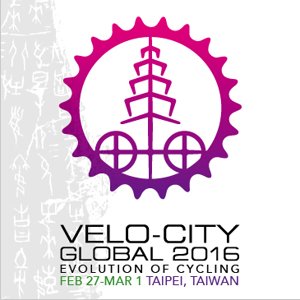 At the end of the closing ceremony Chou Li-Fang, Deputy mayor of Taipei (Taiwan), introduced Taipei as the host of the next ECF Velo-city Global Conference for 2016. The conference will be held in in the "Bicycle Kingdom" from 27. February till 1. March 2016.
At the end of the closing ceremony Chou Li-Fang, Deputy mayor of Taipei (Taiwan), introduced Taipei as the host of the next ECF Velo-city Global Conference for 2016. The conference will be held in in the "Bicycle Kingdom" from 27. February till 1. March 2016.
See you all in Taipei!
- Log in to post comments
Contact the author
Recent news!
Contact Us
Avenue des Arts, 7-8
Postal address: Rue de la Charité, 22
1210 Brussels, Belgium

